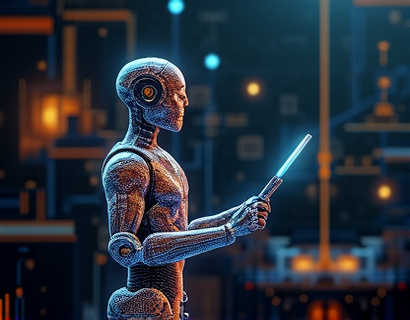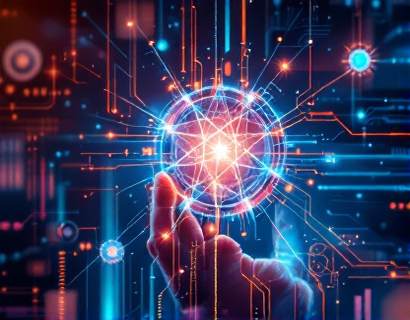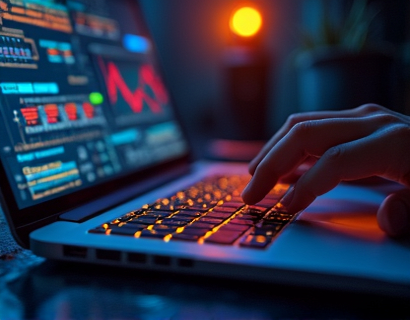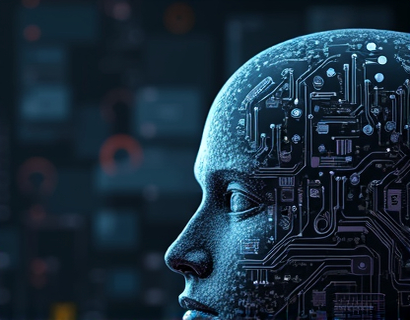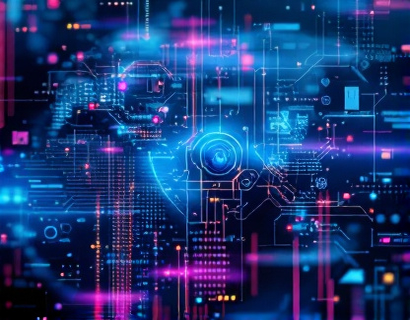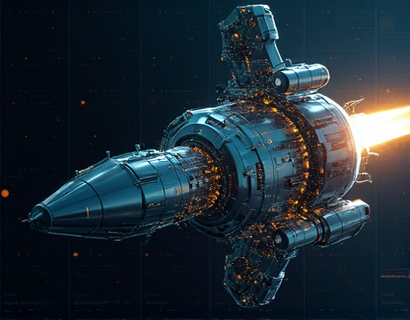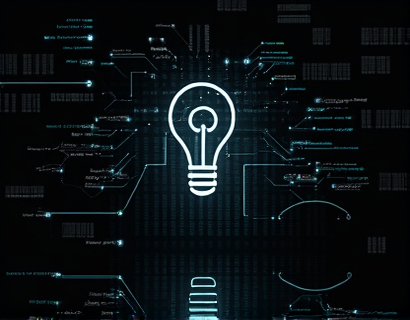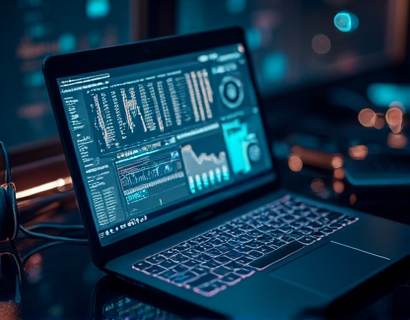AI and Crypto: Pioneering Next-Gen Digital Ecosystems
The intersection of artificial intelligence (AI) and cryptocurrency is giving rise to a new era of digital ecosystems, transforming the way innovators approach and interact with crypto applications and services. This fusion is not just a technological advancement but a paradigm shift, offering unprecedented opportunities for connectivity, security, and efficiency. As we delve into this topic, we will explore the innovative strategies and cutting-edge technologies that are redefining the crypto landscape, providing tech-savvy innovators with advanced tools and strategic marketing to enhance their digital experiences.
The integration of AI in the crypto space is multifaceted, impacting various aspects from security and trading to user experience and application development. AI algorithms can analyze vast amounts of data to predict market trends, optimize trading strategies, and enhance the security of blockchain networks. For developers and innovators, this means access to powerful tools that can streamline processes, reduce costs, and open up new avenues for growth and innovation.
Enhanced Security Through AI
One of the most significant benefits of AI in the crypto ecosystem is the enhancement of security measures. Blockchain, the backbone of cryptocurrencies, is inherently secure but not immune to threats. AI can detect and mitigate potential security risks by analyzing patterns and anomalies in transaction data. Machine learning models can identify suspicious activities and automate responses to potential threats, ensuring a more robust and secure environment for users.
For instance, AI-driven systems can monitor blockchain networks in real-time, identifying and isolating malicious nodes or transactions. This proactive approach to security not only protects users' assets but also builds trust in the crypto ecosystem. Innovators can leverage these advanced security solutions to create more reliable and trustworthy applications, attracting a broader user base and fostering long-term engagement.
Optimized Trading and Investment Strategies
AI is revolutionizing the way traders and investors approach the crypto market. Traditional trading methods often rely on human intuition and experience, but AI can process and analyze vast amounts of data at speeds and scales impossible for humans. This capability allows for more accurate and timely decision-making, leading to better investment strategies and higher returns.
AI algorithms can perform technical analysis, sentiment analysis, and predictive modeling to identify optimal trading opportunities. For example, natural language processing (NLP) can analyze news articles, social media posts, and other textual data to gauge market sentiment and predict price movements. These insights can be integrated into trading platforms, providing users with real-time recommendations and automated trading bots that execute strategies based on AI-driven insights.
Personalized User Experiences
The fusion of AI and crypto also enhances the user experience by offering personalized services and recommendations. AI can analyze user behavior, preferences, and transaction history to tailor the user interface and functionality to individual needs. This personalization extends to content delivery, where AI can curate news, articles, and educational resources based on a user's interests and knowledge level.
For crypto enthusiasts and newcomers alike, this means a more intuitive and engaging experience. Users can access relevant information, tutorials, and community discussions tailored to their level of expertise, fostering a more inclusive and supportive ecosystem. Innovators can leverage these personalization tools to create applications that not only meet but exceed user expectations, driving adoption and loyalty.
Smart Contract Automation
Smart contracts, self-executing contracts with the terms directly written into code, are a cornerstone of blockchain technology. AI can further enhance the functionality and efficiency of smart contracts by automating complex processes and ensuring compliance with predefined rules. AI algorithms can analyze and optimize smart contract code, identifying potential vulnerabilities and suggesting improvements.
For example, AI can help in the creation of decentralized finance (DeFi) applications, where smart contracts manage lending, borrowing, and trading without intermediaries. By integrating AI, these applications can adapt to market conditions, adjust parameters in real-time, and provide more sophisticated financial services. This automation not only reduces the risk of human error but also increases the speed and reliability of transactions.
Innovative Application Development
The combination of AI and crypto opens up new possibilities for application development in various domains. From supply chain management to healthcare, the potential applications are vast and varied. Developers can create decentralized applications (dApps) that leverage AI to provide intelligent, data-driven solutions.
In the realm of supply chain management, AI-powered dApps can track the movement of goods in real-time, ensuring transparency and traceability. By integrating blockchain for immutable records and AI for predictive analytics, these applications can optimize inventory management, reduce costs, and enhance customer satisfaction. Similarly, in healthcare, AI-driven dApps can analyze patient data to provide personalized treatment recommendations, while blockchain ensures the secure and privacy-preserving storage of medical records.
Case Study: AI-Enhanced DeFi Platform
To illustrate the practical applications of AI in the crypto ecosystem, consider a hypothetical DeFi platform that integrates AI for risk management and portfolio optimization. This platform uses AI algorithms to monitor market conditions, assess risk levels, and adjust investment strategies accordingly. Users can benefit from real-time insights and automated trading bots that execute trades based on AI-driven recommendations.
The platform also employs AI for fraud detection, analyzing transaction patterns to identify and prevent malicious activities. This multi-layered approach to security and optimization not only enhances user trust but also sets the platform apart in a competitive market. Innovators can use this as a blueprint to develop similar solutions, leveraging the synergy between AI and crypto to create robust and innovative financial services.
Strategic Marketing in the AI-Crypto Ecosystem
For innovators looking to capitalize on the AI-crypto synergy, strategic marketing is crucial. The tech-savvy crypto community is highly informed and discerning, requiring a marketing approach that is both educational and engaging. Here are some key strategies to consider:
- Content Marketing: Create high-quality, informative content that explains the benefits of AI in the crypto space. Blog posts, whitepapers, and video tutorials can help educate users and establish your brand as a thought leader.
- Community Engagement: Build and actively participate in crypto and AI communities on social media, forums, and specialized platforms. Engaging with users, answering questions, and providing value can foster a loyal following and generate organic buzz.
- Influencer Collaborations: Partner with influencers and experts in both the crypto and AI fields to reach a wider audience. Their endorsement can lend credibility to your project and attract new users.
- Data-Driven Campaigns: Utilize AI to analyze user data and tailor marketing campaigns to specific segments. Personalized messages and targeted ads can increase engagement and conversion rates.
- Hackathons and Competitions: Host or sponsor hackathons and coding competitions focused on AI and crypto. This not only showcases your commitment to innovation but also attracts talented developers who can contribute to your project.
By implementing these strategies, innovators can effectively market their AI-crypto solutions, building a strong and engaged user base. The key is to provide value at every touchpoint, from education to community involvement, ensuring that users see the tangible benefits of your technology.
Future Prospects and Challenges
The future of AI and crypto is promising, with numerous opportunities for growth and innovation. However, there are also challenges that need to be addressed. Regulatory uncertainty, scalability issues, and the need for standardization are among the key hurdles. Innovators must stay informed about regulatory developments and work towards compliance while advocating for a balanced and forward-thinking approach.
Scalability remains a critical challenge, as both AI and blockchain technologies need to handle increasing amounts of data and transactions efficiently. Research into more efficient algorithms and infrastructure solutions is ongoing, and early adopters can benefit from being part of this evolutionary process.
Standardization is another area where collaboration is essential. Developing industry-wide standards for AI and crypto integration can facilitate interoperability and trust, making it easier for innovators to build and deploy solutions. Participating in standards organizations and contributing to open-source projects can help shape the future of the ecosystem.
Conclusion
The fusion of AI and crypto is transforming the digital landscape, offering innovative tools and strategies that can revolutionize the way we interact with and utilize blockchain technology. For tech-savvy innovators, this presents a unique opportunity to create cutting-edge applications and services that enhance user experiences and drive growth. By embracing the synergy between AI and crypto, innovators can not only stay ahead of the curve but also shape the future of the digital ecosystem.





